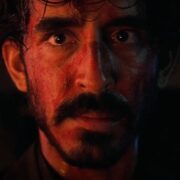The Biggest Sick: Muslim Representation As Muslim Assimilation
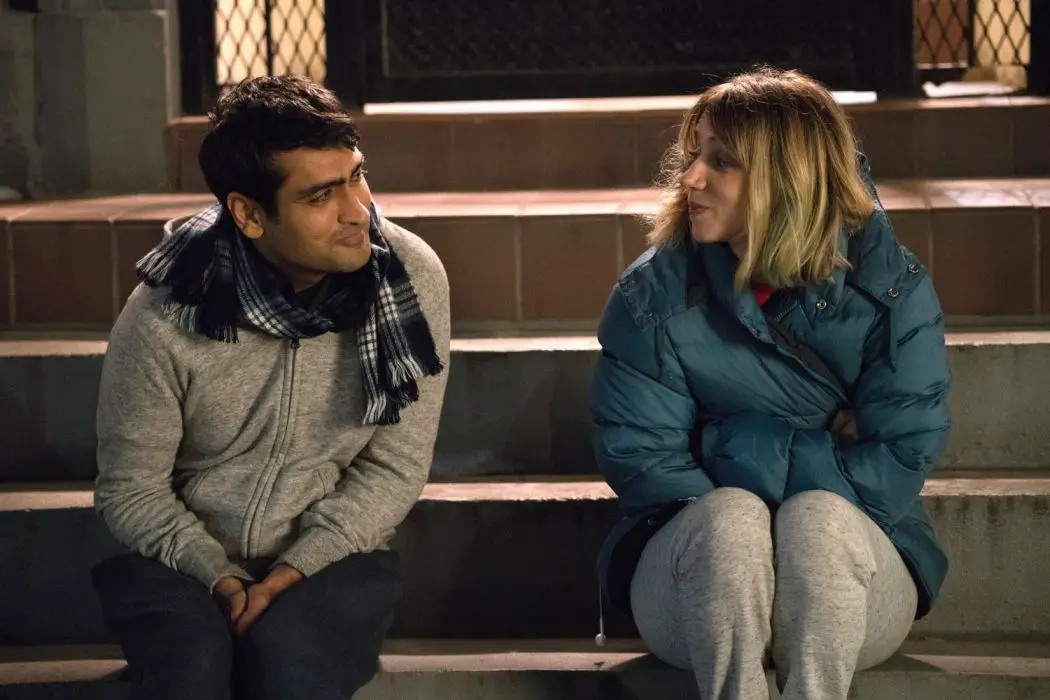
Hazem Fahmy is a poet and critic from Cairo. He…
If I have to explain to you how toxic the representation of Muslims in mainstream American media is, you’re probably not paying much attention. No offense. Unless you’re actively choosing to not pay attention, in which case I don’t really know what to tell you, except: maybe pay some attention? Now, let’s assume you have. I’d rather we do because then I don’t have to get into the whole terrorists, oppressed women, lavish oriental backdrops, angry bearded men, funny accents – yada, yada, yada. You know the drill, no pun intended.
Though I grew up in Cairo on a steady diet of Egyptian cinema and television, I’ve always hungered for Arab and Muslim representation in American media. This was less out of a lack of heroes for me to look up to and more out of a desire for Americans to stop asking me stupid questions. I believed unequivocally in the power of the image, its unrivaled ability to hold space and evoke empathy. I genuinely thought that a higher number of visible Muslim faces was all it took for a more nuanced and compassionate understanding of the Muslim experience to diffuse throughout American culture. Those were more innocent days.
Having seen The Big Sick, I can, without an ounce of hyperbole, tell you that if The Big Sick is set to be the standard for Muslim American representation, I’d rather not be represented. Unlike the hordes of white, liberal critics who sang the film’s praises, hailing it as a milestone for both romantic-comedies and Hollywood’s glacially paced journey towards diversity, I abhorred The Big Sick. It left me miserable in my own skin.
After the credits rolled, I sat there, stewing in all the discomfort and insecurity I have constantly felt as a foreign-raised Muslim now living in America. I went in expecting healing, shaking with excitement at the prospect of a Muslim lead who was unashamed in his identity and heritage, who would not just be accepted, but embraced by others. What I found instead was a twisted take on the already-fraught trope of interracial dating; a story with a deeply cynical core that attempts to chart a troubling path for the young and lost Muslim American.
The Big Sick is a romantic-comedy born of self-hate. I cannot describe it any other way. Rather than dive into the complexities and challenges of hybrid, first-generation identity, it posits a straightforward and disturbing answer to those of us who often feel out of place and in between in America: forget your family’s nonsense and assimilate.
There have already been several terrific and incisive pieces that break down The Big Sick’s problematic dynamic and place it in the context of wider trends. Take Aisha Mirza’s in Raicebaitr or Aditi Natasha Kini’s in Jezebel. I’d like to add to their voices by exploring how Nanjiani throws his own family, as well as countless Pakistani women, under the bus through his cruel distribution of empathy.
Family (and Cultural) Matters
Let’s get one thing out of the way. Like many of The Big Sick’s defenders, I agree that there’s absolutely nothing wrong with a Muslim American man rejecting facets of his culture. It is beyond common for Muslim youth, whether in their own homeland or the diaspora, to feel alienated by traditions that were perfectly routine for their parents just a generation ago. People feel alienated from their own culture or family. It happens. This is not the issue. I know what it feels like to be incessantly asked when I’m going to find a good Muslim, Egyptian girl. I too don’t enjoy it.
This depiction of Muslim American alienation would not be a problem in the slightest if it wasn’t so rooted in an overt desire for assimilation, specifically assimilation to white Americanness. It would have been a different story if Nanjiani’s rejection of arranged marriage was framed as just that, a rejection of a practice he feels has become antiquated and impractical to his own life. But instead, he jumbles together every conversation, act or scene that is coded as Pakistani into an abstracted shadow that hangs over his life, tainting his every choice and holding him back from true happiness – which is evidently coldly ditching your family and running off to New York with your white friends.
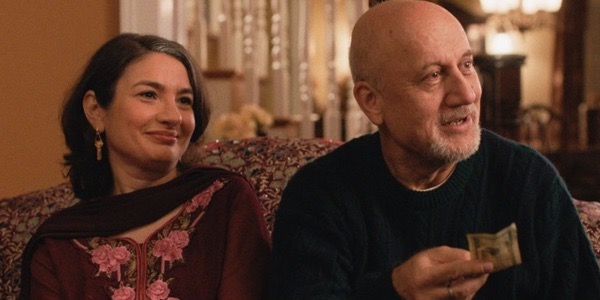
I spoke before about empathy. Consider the difference in how Kumail’s family is portrayed versus Emily’s. The Gordons are flawed, sure – for starters, the father makes an overtly racist remark the first time they meet – but they are treated as fully-fleshed characters, rife with quirks and chances to grow. In other words, they have an actual arc. We get to know them, their histories, their joys, their relationship with Emily. They eventually understand that they were wrong about Kumail, and they repay his love for Emily with affection and tenderness.
In sharp contrast, the Nanjianis are cold and stubborn. They cannot fathom a universe in which their son could grow up to be different than them. It is either their way or… there is no other way. As opposed to the warm Gordons who are capable of growth and understanding, this preposterous arrogance with which Nanjiani renders his own family basks in a plethora of Muslim stereotypes about backwardness and a complete inability to grasp ‘modern’ values such as individuality and irreligiosity. Even the camera treats each family differently. With the Gordons, it roams, switches angles. With the Nanjianis it is perfectly static, monotonous. Every dinner is the same. Every caricature of a Pakistani woman paraded before him sits in the same seat, except for that one who sat on the couch.
Every attempt made by his family to explain their side is thwarted by Nanjiani (and Gordon’s) unforgiving script. We see this most in his brother’s half-assed attempts to defend arranged marriage, a brief series of conversations that are milked for the mockery of the stereotypical boring, parent-abiding Muslim American man. Naveed (played almost deadpan by Adeel Akhtar) tries to use the same logic that Kumail had for sure heard a thousand times at that point in his life, saying: it gets better, loves grows over time, parents know better, etc. But The Big Sick does everything it can to prove the opposite. It portrays Naveed and his wife as a dull, completely domesticated couple, with no interesting opinions or points of conversation. For Kumail, and the audience by extension, this ceases to be a rejection of a practice and it becomes a rejection of a culture, whose caricatures are embodied within his own family.
Consistent Double-Standard
Bizarrely, Nanjiani applies this same racialized double standard to his own self in his relationship with Emily. In their nonsensical break-up scene, Emily discovers the pictures of Pakistani women that Kumail’s parents have been trying to set him up with. Rather than take the time to understand where he’s coming from (literally) she flips out and soon after storms out – and this is somehow framed as his mistake. This was actually the single scene in The Big Sick where I found myself fully and unequivocally on Kumail’s side. In her entitled white woman tantrum, Emily demands to know why Kumail hadn’t told her about his parents’ desire to get him an arranged marriage and he fires back: “because I didn’t think you’d f*cking understand! And I was f*cking right!” And he was! He was f*cking right, she doesn’t understand, instead she goes immediately on the offensive and doesn’t spare a single moment of patience.
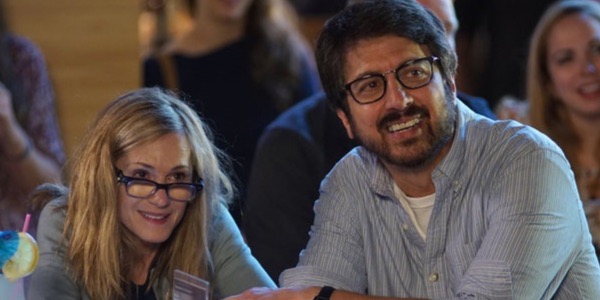
The underlying shame, embarrassment and confusion that Kumail expresses in this scene is common for a lot of first-generation Muslim Americans, especially those who are still learning to balance their own identity with their existence in America. It’s simply not a dynamic that well-off white Americans from families like Emily’s understand. Believe me, I’ve tried explaining ‘my culture’ to a white partner before. It was not fun. A lot of behaviors of immigrant parents, especially when it comes to the preservation of culture and cultural identity, can be hastily and lazily labeled as abusive and toxic by white Americans when in reality it is more often far more complicated than that. This doesn’t dismiss the harm of said behaviors, or the fact that it is sometimes simply abusive or toxic, rather this is to say that it usually stems from a genuine anxiety that is rooted in the uncertainty and instability of diasporic life.
A far more nuanced portrayal of this first-generation son, immigrant parents dynamic is delivered in Aziz Ansari’s second season of Master of None (forgive me, I know it’s not the best time to bring up Ansari’s work without giving space to recent allegations, but as we’re assuming you’ve been paying attention, you know there’s literally no other mainstream Muslim example, at least not one equivalent in reach to Nanjiani). Of course, the show is by no means perfect , especially as it also features a disproportionate rate of white romantic and sexual interests, but it does succeed over The Big Sick in the “Religion” episode, when Dev decides to openly order pork in front of his devout Muslim family.
Here, too, there is a backlash. Dev’s mother is deeply offended by his flagrant irreligiosity and refuses to speak with him for two weeks. However, the episode’s thematic arc drastically differs from The Big Sick in that Dev actually takes the time to figure out where he has gone wrong and, more importantly, to fix his mistake. In one of the most charming, and resonant, lines of the entire show, his father states: “Look, man. You can drink, you can eat pork, you can smoke Mary Jane, that’s your business. But when you do it in front of mom, it hurts her feelings.” It’s a deeply profound moment, one that I have personally experienced with my own parents as a young Muslim who does not keep Halal. In this way, Ansari effectively bridges his parents’ perspective with his own, extending empathy for both Dev and the family, for whom religious identity is an essential part of their lives. Like all the show’s best episodes, it’s thoroughly hilarious without ever being at the expense of its characters.
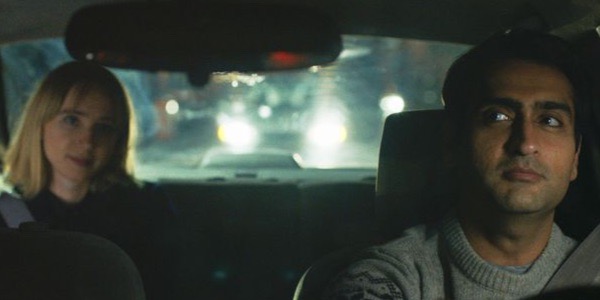
But this empathy and understanding is scarcely to be found for the brown people in The Big Sick, not even for Kumail himself. There is no moment of quiet understanding and mutual growth, instead his own family is shown as heartless and incapable of comprehending difference. The climax of this toxic dynamic comes in the horrific scene in which Kumail offers Emily the ashes of the pictures of Pakistani women that had so upset her. It’s a cruelly unnecessary gesture, one that overtly embodies the disastrous trope of men of color forsaking women of their own ethnicity in favor of white women. Why would she need such a literally violent act to forgive him? Why does she even need to forgive him? He is essentially apologizing for being Pakistani.
Conclusion: The Big Sick
As such, it never surprised me how and why so many white people adore this film. It’s a mockery of Muslim American identity crafted by a Muslim American’s own hands; an invitation to come and laugh at the silly, backwards brown people and their idiotic, vulgar ways. We spend most of our time watching a Muslim American man sacrifice his time, energy and resources to ask forgiveness from a spoiled white girl who furiously rejected him the second she became aware of their cultural difference. Emily’s liberal racism is the very reason parents of color, including my own, warn their children not to date white people. But of course, she ends up being the victim. In this way, The Big Sick is thematically an anti-Get Out, a film that actively soothes white liberal anxiety by basking in the violence of interracial relationships where the white partner exercises more control and legitimacy.
Of course, defenders will point to the fact that this film is semi-biographical, that it is based on the real-life courtship of a Pakistani man with a white American woman. This is all well and fine, but again it does not validate the inhumanity with which Nanjiani treats every Pakistani in this film. I’m sure the actual Gordons are perfectly nice people, or whatever, just as I’m sure that Nanjiani has genuinely experienced these feelings of alienation with his actual family and culture. It’s the framework that’s devastating, disfiguring what could have been a charming love story into an argument for assimilation, for shutting the door on family and heritage in favor of pursuing white love and acceptance – whatever the cost, even if it means burning your people to get a white girl back. If nothing else, The Big Sick is a stark reminder of the high price people of color often have to pay to feel ‘accepted’ in this country. I suppose I should thank Nanjiani for that. Just don’t expect me to root for his self-hating ass anytime soon.
What do you think is the filmmaker’s role in representation? Tell us your thoughts in the comments below!
Does content like this matter to you?
Become a Member and support film journalism. Unlock access to all of Film Inquiry`s great articles. Join a community of like-minded readers who are passionate about cinema - get access to our private members Network, give back to independent filmmakers, and more.
Hazem Fahmy is a poet and critic from Cairo. He is an Honors graduate of Wesleyan University’s College of Letters where he studied literature, philosophy, history and film. His work has appeared, or is forthcoming in Apogee, HEArt, Mizna, and The Offing. In his spare time, Hazem writes about the Middle East and tries to come up with creative ways to mock Classicism. He makes videos occasionally.













